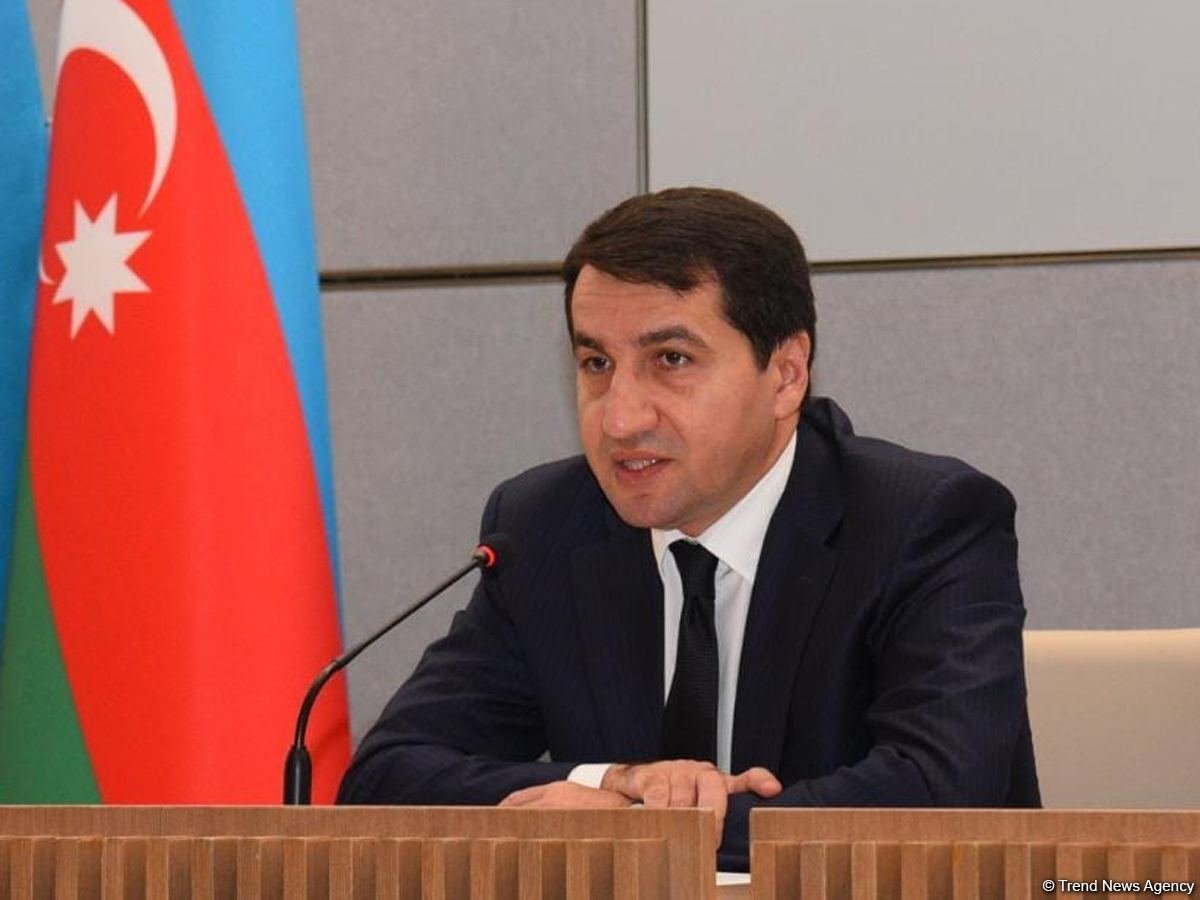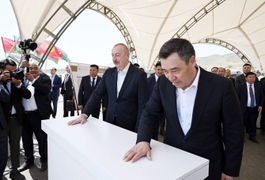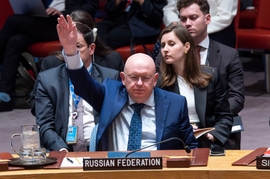Azerbaijani President's Assistant Hikmet Hajiyev has said that Azerbaijan and Armenia, which fought two bloody wars in the Karabakh region, are currently going through a period unforeseen in bilateral relations over the past decades.
In an interview with BBC World on Tuesday, Hajiyev said Baku and Yerevan managed to surprise the world with a positive agenda by taking mutual confidence-building measures through direct talks without mediators.
“The military confrontation is over. Indeed, Azerbaijan restored its sovereignty and territorial integrity, and Azerbaijan ended the 30-year-long military occupation of its territories. Azerbaijan declared after the end of the 44-day war in 2020 that it is ready to sign a peace treaty with Armenia. For that reason, Azerbaijan also suggested the five fundamental principles and text of the peace treaty. Currently, there is a diplomatic engagement between the parties - Armenia and Azerbaijan. These are direct talks,” he stated.
Hajiyev recalled the recent joint statement made by the two neighboring countries, saying it was a manifestation of reciprocal efforts to advance the peace agenda and implement confidence-building measures.
“The last three months could be considered as the most calm and peaceful period in the history of the Armenia-Azerbaijan relationship since the independence of the two countries. There is no war, no atrocities, and no confrontation, with soldiers returning to their barracks. Relative peace has been ensured on the ground. Now is the time to transform it into a long-lasting peace, including the signing of a peace treaty,” he noted.
The authorities of Azerbaijan and Armenia issued a joint statement on December 7, announcing mutual agreements on key confidence-building measures to facilitate the signing of a peace treaty. Yerevan withdrew its candidacy for hosting the upcoming COP29 Summit to support Azerbaijan’s bid for the same status. In response, the government of Azerbaijan announced its support for Armenia’s candidature for Eastern European Group COP Bureau membership.
On December 13, Azerbaijan and Armenia exchanged detainees to fulfil one of the key confidence-building measures announced in the mutual agreement. A total of 34 servicemen from both sides were released, according to the State Commission of Azerbaijan on Prisoners of War, Hostages and Missing Persons. The Azerbaijani side handed over 32 military servicemen to Armenia on the interstate border in the western Gazakh region. Armenia reciprocated by releasing 2 Azerbaijani captives.
Before issuing the joint statement, Azerbaijan and Armenia also resumed collaboration on November 30 between their state border delimitation commissions. Delimiting borders is a key issue to be included in the peace treaty.
President Ilham Aliyev, in a recent interview with Euronews on December 9, commented on optimistic hopes for signing a peace treaty.
“I think there's no alternative for peace. If a peace agreement is not signed that will be very bad for the whole region. We want a region of the Southern Caucasus to get rid of any risks. Of course, we want Armenia, today and in the future, never put under question our territorial integrity, and abandon completely any territorial claims to Azerbaijan,” President Aliyev said, adding that currently no serious obstacle is blocking the way to peace agreement.
Armenia and Azerbaijan had been in an armed conflict for 30 years over the Karabakh (Garabagh) region, which is an internationally recognized territory of Azerbaijan. Armenia launched full-blown military aggression against Azerbaijan following the Soviet Union’s dissolution in 1991. The bloody war lasted until a ceasefire in 1994 and resulted in Armenia occupying 20 percent of Azerbaijan’s internationally recognized territories. Over 30,000 Azerbaijanis were killed and one million expelled from those lands in a brutal ethnic cleansing campaign conducted by Armenia.
On September 27, 2020, the decades-old conflict took a violent turn after Armenia’s forces deployed in the occupied Azerbaijani lands shelled military positions and civilian settlements of Azerbaijan. During the counterattack that lasted 44 days, Azerbaijani forces liberated about 300 settlements, including the cities of Jabrayil, Fuzuli, Zangilan, Gubadli, and Shusha, from nearly 30 years of illegal Armenian occupation. The war ended in a tripartite statement signed on November 10, 2020, by Armenia, Azerbaijan and Russia. Under the statement, Armenia also returned the occupied Aghdam, Kalbajar, and Lachin districts to Azerbaijan.
Certain parts of the Karabakh region, including the city of Khankendi, as well as some parts of Khojaly and Khojavand districts, remained within the temporary monitoring zone of the Russian peacekeeping mission deployed in the region after the 2020 war.
Despite the legally binding demands on the withdrawal of the Armenian forces from the Karabakh region, 10,000-strong personnel were stationed across the region. The Russian peacekeepers on the grounf failed to enforce the withdrawal despite their relevant obligations.
Since 2020, the Armenian army formations committed dozens of provocations, causing loss of life on the Azerbaijani side.
Azerbaijan Armed Forces launched on September 19 local anti-terrorist measures to neutralize illegal Armenian armed formations and their military infrastructure in the Karabakh region. By the time of the cessation of hostilities, the Azerbaijani troops disabled the military hardware deployed by the illegal Armenian forces. In addition, more than 90 combat posts and strategically important positions were taken under control during the one-day operation until September 20.
On September 20, the illegal separatist regime requested through the Russian peacekeeping command to cease the local anti-terror activities by agreeing to withdraw and complete disarmament of the Armenian armed formations.
On September 28, the Armenian separatist regime in the Karabakh region of Azerbaijan announced self-dissolution and called on the Armenian residents of the Karabakh region to become acquainted with the conditions of reintegration presented by Azerbaijan, in order to subsequently make an independent and individual decision on the possibility of staying in (or returning to) the Karabakh region.
President Aliyev hoisted the state flag of Azerbaijan in Khankendi on October 15.







 President Ilham Aliyev shed light on the evolving contours of the peace process with Armenia during an international conference in Baku this week. ...
President Ilham Aliyev shed light on the evolving contours of the peace process with Armenia during an international conference in Baku this week. ...
 Azerbaijan and Armenia started the process of demarcation of their border on Tuesday, with the installation of the first border markers based on ge...
Azerbaijan and Armenia started the process of demarcation of their border on Tuesday, with the installation of the first border markers based on ge...
 Iran and Pakistan have signed eight cooperation documents in various fields, and agreed to strengthen ties to fight terrorism in the region.
Iran and Pakistan have signed eight cooperation documents in various fields, and agreed to strengthen ties to fight terrorism in the region.
 Iranian President Ebrahim Raisi expressed Tehran’s readiness to participate in significant development projects in Sri Lanka during the inauguratio...
Iranian President Ebrahim Raisi expressed Tehran’s readiness to participate in significant development projects in Sri Lanka during the inauguratio...
 As the conflict between Ukraine and Russia escalates, the strategic importance of Kharkiv, Ukraine's second-largest city, has come sharply into focus.
As the conflict between Ukraine and Russia escalates, the strategic importance of Kharkiv, Ukraine's second-largest city, has come sharply into focus.



